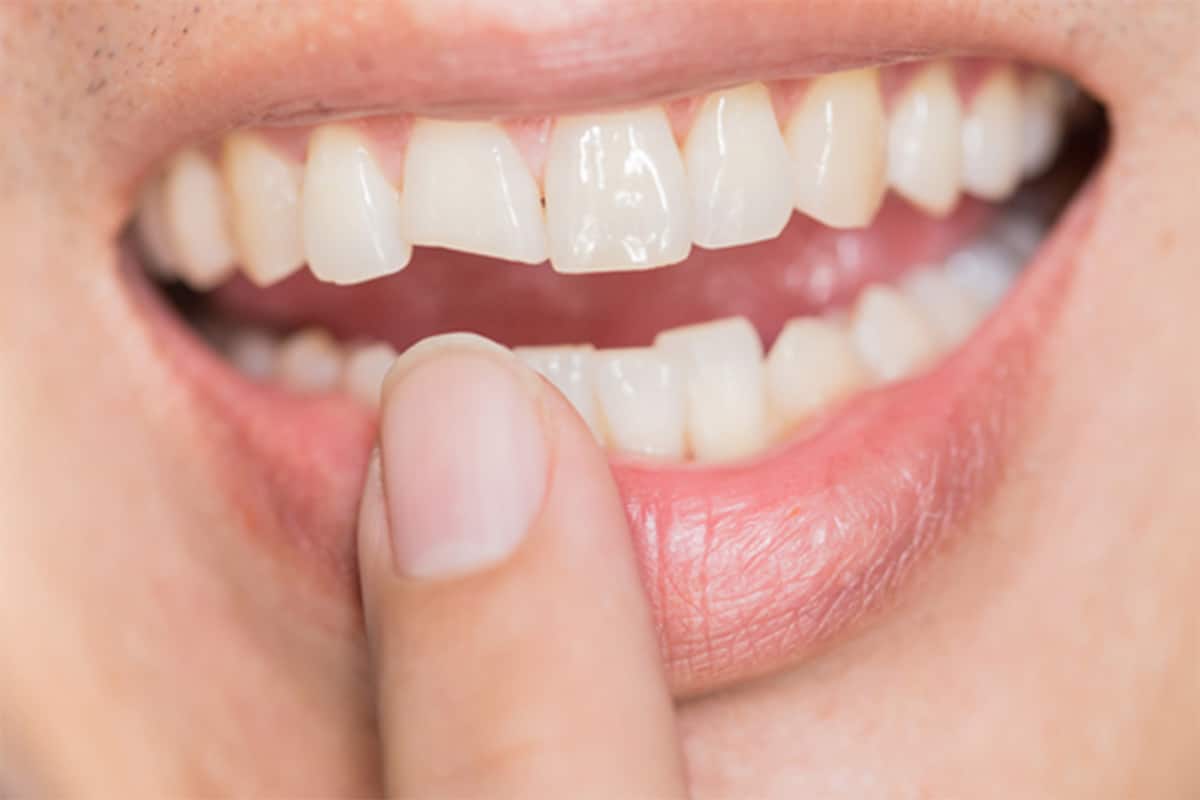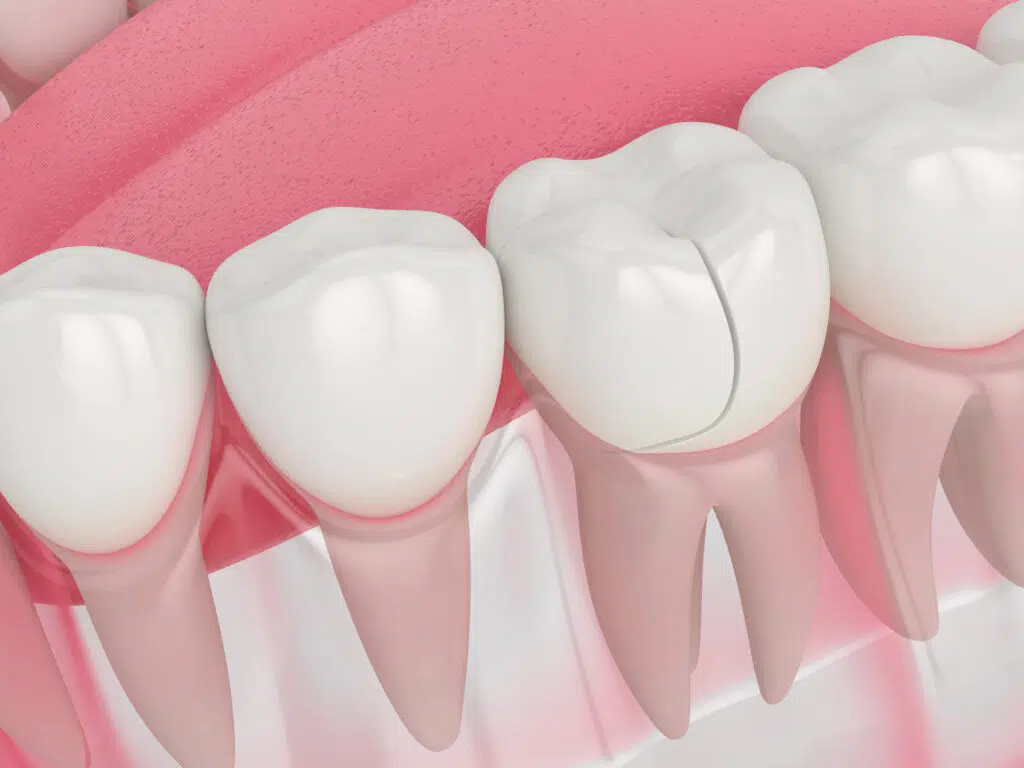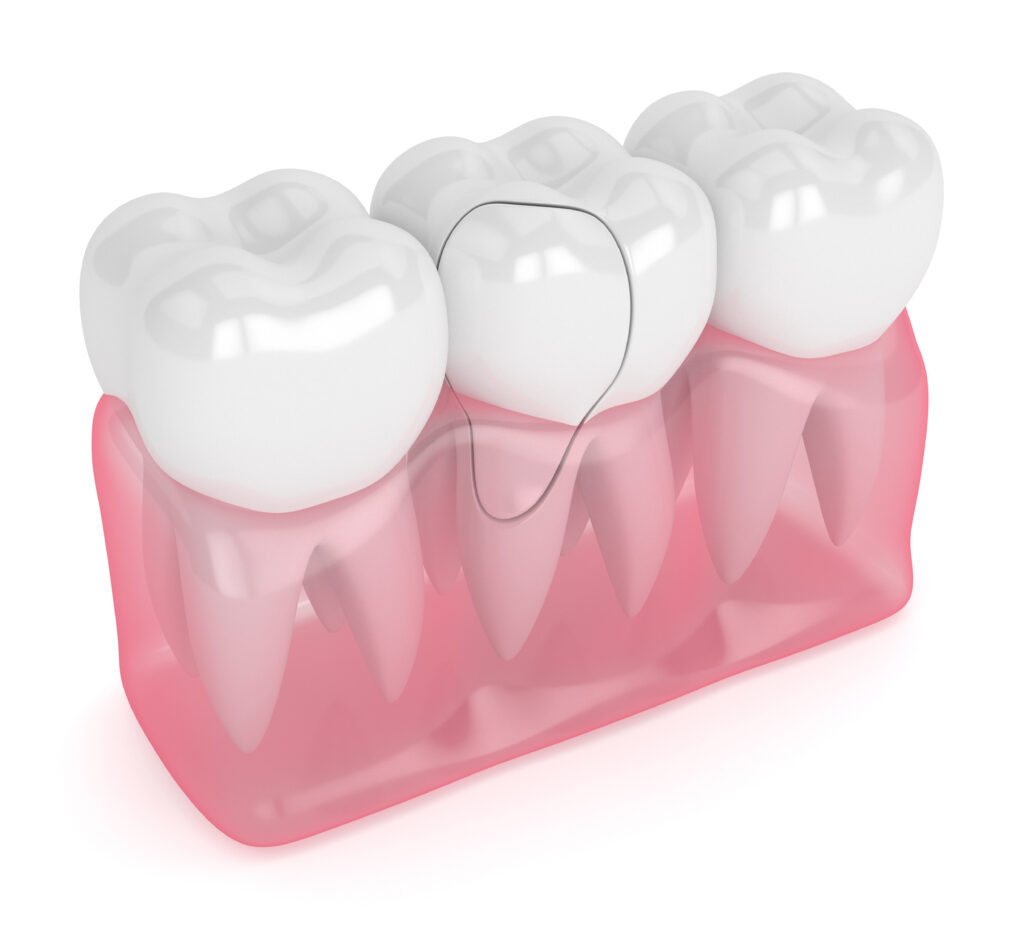
Definition of Cracked Tooth
A cracked tooth is a type of dental condition in which a tooth sustains some type of fracture, whether from trauma or damage to the enamel. It is important to understand that there are different types of cracks that can occur in teeth. The most common types are craze lines, fractured cusp, and broken teeth.
Craze lines are very thin fractures on the surface of a tooth and usually do not require treatment. A fractured cusp refers to when a cusp, or sharp tip of a tooth, has been physically broken off. This often requires restorative care, such as crowns or other forms of protection to prevent further damage. Broken teeth involve more significant fractures that may extend below the gum line it could even require extraction if the damage is too severe.
It is important to seek professional help when dealing with cracked teeth because early diagnosis can mean all the difference in saving your natural teeth or having them extracted and replaced with dental implants or bridges. The periodontists at Gallardo Periodontics and Implant Dentistry have years of experience in diagnosing and treating any type of cracked tooth, so you can be sure you’ll receive personalized care tailored specifically to your needs and goals.
Types of Cracked Teeth
There are several types of cracked teeth, each requiring different dental treatments. The most common type is a split tooth, which occurs when a fissure or crack runs across the tooth from top to bottom. This type of crack is usually caused by clenching or grinding the teeth and can lead to further damage if left untreated.
Another type of cracked tooth is a vertical root fracture. This occurs when a crack extends down into the root of the tooth and can be difficult to detect without X-rays. In this case, an extraction may be necessary to prevent further damage.
Incomplete fractures occur when only part of the enamel breaks away from the underlying dentin layer. While this type of fracture does not always require treatment, it should still be monitored in case it becomes larger and more severe over time.
It is important to note that all these types of cracked teeth are considered dental emergencies and should be checked out as soon as possible by your periodontist at Gallardo Periodontics and Implant Dentistry for proper diagnosis and treatment options!
Causes of Cracked Teeth
The most common cause of a cracked tooth is trauma or damage to the enamel. This can be caused by biting down on something hard, grinding your teeth, or otherwise damaging your teeth. Other causes include excessive pressure from clenching and grinding, weakened tooth structure due to cavities or decay, and gum disease.
When a crack occurs in the enamel, it can lead to sharp pain when eating or drinking certain foods and liquids. The fracture can also cause chipped teeth that are visible to the naked eye. If left untreated, this can lead to further damage inside the tooth, such as injury to pulp tissue and nerve endings. That is why it is important for every person who experiences any type of dental trauma to seek professional care from a dental professional like those at Gallardo Periodontics and Implant Dentistry.

Diagnosing a Cracked Tooth
We strive to provide our patients with the best possible care when it comes to diagnosing a cracked tooth. An experienced dentist can often diagnose a cracked tooth based on the patient’s dental pain or visible signs of injury.
The first step in diagnosing a cracked tooth is for the dentist to perform a clinical exam to check for any damaged areas. During this exam, the dentist will look at your teeth and gums to check for any breaks, chips, or other visible signs of damage. They may also take X-rays to get an even better picture of what’s going on inside your mouth. After evaluating the damage, they will be able to determine how best to treat the broken molar.
If left untreated, cracks can cause further damage, such as an increased risk of infection or even leading to complete tooth loss. That’s why seeking treatment from an experienced dentist like those at Gallardo Periodontics and Implant Dentistry is so important! We are committed to helping you maintain healthy teeth and keep them looking great!
Physical Examination by a Dentist
When a patient presents with a cracked tooth, they are usually in severe pain. A dentist must first conduct a thorough physical examination of the affected area in order to determine the extent of the damage and decide on the best course of action. During this examination, the dentist will check for any visible fractures and examine the connective tissue around the tooth. They may also take X-rays to get an even better picture of what’s going on inside your mouth.
Once the dentist has identified an area of concern, they will be able to provide you with treatment options and help alleviate your pain. Depending on the severity of your fracture, you may need emergency dental care or a simple filling to repair it. In some cases, further treatment, such as root canal therapy, may be required in order to avoid future complications or potential tooth loss.
X-rays and other Imaging Techniques
X-rays and other imaging techniques are an important part of diagnosing a cracked tooth. At Gallardo Periodontics and Implant Dentistry, we use advanced imaging technologies to get an accurate picture of your fractured teeth. This ensures the most effective method for treatment is chosen. X-rays help us visualize hidden fractures that may have gone unnoticed by the naked eye and assess any damage to the dental pulp beneath the enamel.
At our practice, our team of highly skilled specialists uses digital X-rays to obtain images with less radiation exposure than traditional X-rays. These images allow us to detect even small fractures that would otherwise go undetected and identify areas of decay or infection in the gums or root canal. With this information, we can determine the best course of treatment for your particular situation and provide you with relief from pain or discomfort as quickly as possible.

Treatment for Cracked Teeth
We understand how important it is for our patients to receive the proper care when dealing with a cracked tooth. Our experienced team of periodontists will assess your individual case and develop an effective treatment plan tailored specifically for you. Depending on the severity of the crack, treatment may range from fillings or crowns all the way up to root canal therapy or even extraction of multiple teeth if needed.
Bonding or Filling the Crack
We may use dental bonding or filling material to repair a cracked tooth. Dental bonding is when a plastic resin material is applied to the cracked area and then hardened with ultraviolet light. This treatment can restore the shape and appearance of the tooth while preventing further damage or loss. Composite bonding is another option that involves using a type of plastic resin that can be shaped and molded before it’s hardened.
For larger cracks, we may recommend using filling material such as porcelain. This type of filling is strong, durable, and long-lasting, so it helps protect the cracked area from further damage. Porcelain fillings also provide a natural look since they are designed to match your existing teeth in color and texture.
Dental Crowns to Restore Functionality and Appearance
Dental crowns are an excellent way to restore the functionality and appearance of a cracked tooth. Crowns can be either temporary or permanent and are designed to fit over the existing tooth structure like a cap, protecting it from further damage. Temporary crowns are typically made of acrylic or stainless steel and provide immediate relief from pain and discomfort, while permanent crowns use porcelain or other materials for increased durability and a more natural look. Crown restoration also helps protect damaged teeth from decay since it covers up any weakened areas that may be prone to infection.
Extraction in Severe Cases
In severe cases, extraction may be the only option to prevent further damage or infection of the cracked tooth. If extraction is necessary, our skilled periodontists at Gallardo Periodontics and Implant Dentistry can ensure that your procedure is performed quickly, comfortably, and with minimal discomfort. After extraction, we can provide you with a variety of options for replacing the missing tooth, such as dental implants or bridges. Our team will discuss all treatment options with you so you can make an informed decision about what’s best for your oral health needs.
Prevention of Cracks in Teeth
One of the best ways to prevent cracks in teeth is to practice good oral hygiene. Regular brushing and flossing help remove plaque and bacteria that can weaken tooth enamel, making it more susceptible to cracks. It’s also important to limit sugary foods and drinks, as they can lead to tooth decay which can cause further damage. Additionally, avoiding hard foods such as ice or hard candy will reduce the risk of cracking a tooth. Finally, regular dental checkups are essential for early detection of any issues that may arise. With routine visits, our team can monitor your oral health and provide treatments before any serious damage occurs.